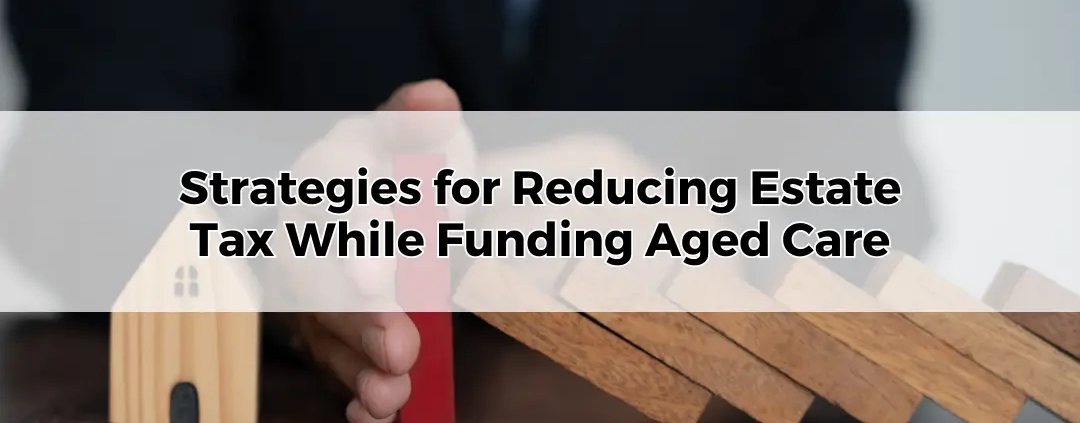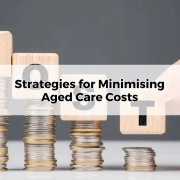Strategies for Reducing Estate Tax While Funding Aged Care
Table of Contents
ToggleBalancing aged care funding with estate planning is a crucial consideration for many Australians. While Australia does not have an inheritance tax, certain costs and taxes related to superannuation, capital gains, and estate management can reduce the value of what you leave behind. With careful planning, you can ensure that aged care is funded while minimising the financial impact on your estate.
This blog outlines actionable strategies for reducing estate-related taxes and costs while securing funds for aged care.
Understanding Estate Tax in Australia
Does Australia Have Estate Taxes?
While there is no direct inheritance or estate tax in Australia, several financial obligations can affect the value of an estate:
- Capital Gains Tax (CGT): Not directly applied to inherited assets, but may arise if the asset is later sold by the beneficiary.
- Superannuation Death Benefits Tax: Tax may apply to superannuation balances left to non-dependents.
- Probate Fees: Costs incurred during the administration of an estate.
How Estate Planning Intersects with Aged Care Costs
Funding aged care often requires accessing assets or income streams that are also part of estate planning considerations. Poor planning can lead to unnecessary tax implications, reduced estate value, and limited flexibility in meeting aged care costs.
Key Strategies to Minimise Estate Costs and Taxes
1. Leverage Superannuation Effectively
Superannuation is a critical tool for estate planning and funding aged care.
Managing Superannuation Death Benefits Tax
- Withdraw taxable components of superannuation during your lifetime to reduce potential taxes for non-dependent beneficiaries.
- Ensure your death benefit nominations are up to date and, where appropriate, nominate dependent beneficiaries to avoid the death benefits tax.
Using Superannuation for Aged Care
Superannuation can be a primary source of funding for aged care, particularly if withdrawn in a tax-efficient manner. Balancing withdrawals with tax planning is key to preserving estate value.
2. Protect the Family Home
The family home often represents a significant portion of an estate’s value and offers strategic opportunities for planning.
Primary Residence Exemption
The principal residence is generally exempt from CGT if it is sold or inherited and meets certain conditions. Ensuring the property remains compliant with these rules can preserve its tax-free status.
Downsizing to Fund Aged Care
Selling the family home and moving to smaller accommodation or residential aged care can unlock equity. The downsizer contribution allows up to $300,000 per person to be added to superannuation, providing a tax-effective funding source for aged care.
3. Use Testamentary Trusts for Tax Efficiency
A testamentary trust can offer long-term tax advantages for beneficiaries and greater control over how assets are distributed.
How Testamentary Trusts Reduce Taxes
- Income Splitting: Beneficiaries can split income generated by trust assets, potentially reducing their individual tax rates.
- CGT Deferral: Assets within the trust can defer CGT until sold by the trust or distributed to beneficiaries.
Aged Care Considerations
Assets allocated to a trust may be excluded from means testing, preserving flexibility for funding aged care costs.
4. Gifting Assets Strategically
Transferring assets to family members during your lifetime can reduce estate value and future tax implications.
Centrelink Gifting Rules
Centrelink allows gifting of up to $10,000 per financial year, with a maximum of $30,000 over five years, without affecting Age Pension or aged care means testing.
Risks and Limitations
Exceeding gifting thresholds can impact your Age Pension and aged care fees. A structured plan ensures gifting aligns with both tax and aged care needs.
5. Invest in Aged Care-Friendly Financial Products
Certain financial products are designed to balance aged care funding with estate preservation.
Lifetime Annuities
Lifetime annuities provide a steady income stream for aged care while being partially exempt from Centrelink means testing.
Insurance Bonds
Insurance bonds are tax-advantaged investment vehicles that are exempt from means testing and can pass directly to beneficiaries outside of the estate.
6. Manage Capital Gains Tax Implications
CGT does not apply when assets pass directly to beneficiaries, but planning is required for future sales.
Deferring CGT with Inherited Assets
Inherited assets are transferred at their original cost base. Beneficiaries only incur CGT if and when they sell the asset, making it advantageous to hold onto assets where possible.
Pre-Sale of Assets
In specific situations, selling assets before they are passed on may simplify estate administration, but this approach requires careful tax analysis.
7. Prepay Funeral and Aged Care Costs
Prepaid arrangements can reduce assessable assets while ensuring your wishes are fulfilled.
Prepaid Funeral Plans
These plans are exempt from means testing and ensure that funeral expenses are not a financial burden on the estate.
Refundable Accommodation Deposits (RADs)
Paying a RAD upfront for residential aged care reduces assessable assets and secures a place in aged care facilities.
8. Include Charitable Giving in Your Estate Plan
Philanthropic donations offer tax benefits and preserve your legacy.
Tax Deductions for Charitable Donations
Bequests to registered charities are tax-deductible, reducing overall estate liabilities.
Balancing Philanthropy with Aged Care
While charitable giving is admirable, it’s essential to ensure you retain enough resources to fund aged care needs.
The Role of Professional Advice
Financial Advisers
Specialist aged care financial advisers can help optimise your financial position to balance aged care funding and estate preservation.
Estate Planning Lawyers
An experienced lawyer can structure your will and estate to reduce costs, ensure tax efficiency, and minimise disputes.
Final Thoughts
Balancing aged care funding with estate tax considerations requires proactive planning and a tailored approach. By leveraging tax-effective strategies like superannuation withdrawals, gifting, and testamentary trusts, you can preserve more of your estate for loved ones while ensuring your aged care needs are met.
Engaging professional advisers is crucial to navigating the complexities of tax laws and means testing. Planning today helps secure financial peace of mind for you and a lasting legacy for your family.









